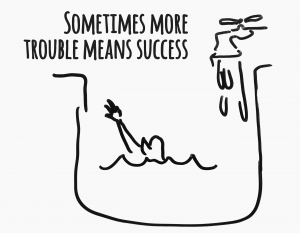Today we commonly feel the urge to move faster – take notice faster, learn faster, decide faster and act faster. It becomes a struggle. Still we can’t just decide: let’s be faster. There are situations, behaviors, previous experience and other things slowing us down. Let’s gather some analysis on what are the common situations asking for faster action, and what could be the simplest solutions at hand helping us find a way to move in a Fast Forward way. Sometimes, however, emotional breakdowns and feeling of failure slow us down considerably – so let us have a look at what can be done about that.
 Long term stress, feeling down, failing to believe in a goal at hand – those are common problems, making lighter or heavier impact on people involved. It’s great if it’s not so. It’s good, if we are able to handle situation by ourselves. Unfortunately, often we aren't strong enough to solve a problem and it’s good to have someone supporting you at such a moment. This topic also might be important to a wide range of managers – employees in stress, feeling “blue” or believing in failure are just not too effective! Even the best of professionals lose their grasp when feeling down. Projects get delayed, people leave companies, and companies face financial losses.
Long term stress, feeling down, failing to believe in a goal at hand – those are common problems, making lighter or heavier impact on people involved. It’s great if it’s not so. It’s good, if we are able to handle situation by ourselves. Unfortunately, often we aren't strong enough to solve a problem and it’s good to have someone supporting you at such a moment. This topic also might be important to a wide range of managers – employees in stress, feeling “blue” or believing in failure are just not too effective! Even the best of professionals lose their grasp when feeling down. Projects get delayed, people leave companies, and companies face financial losses.
So how do you help a friend or a colleague? How to raise his belief in his own success?
The key principle
You have to understand and acknowledge what’s important for him and how he sees the world around. First of all, he believes that the situation is inherently bad. Secondly, his emotions are rather intense, i.e. he sees world emotionally. He’s able to communicate his opinion very logically, providing arguments, but his reaction to arguments provided to him will be more emotional than rational. Thirdly, a person can only stop feeling down by himself – no force on Earth can force anyone to feel good about anything.
What to do
- Don’t oppose, don’t argue, and don’t push! This would be the way towards fight and confrontation. Person telling you how bad it’s going to be is not ready to give up his opinion, even if he desires to be wrong. So – agree! Agree with an evil irony about the situation, but not about the person himself. For him it builds a feeling of being understood. Feeling that you understand him, you think and see the world like he does, you support him – all of that means that therefore you simply cannot remain untrusted.
- Ask. Show some interest. Don’t display irony though, make sure you show that the other person is actually right, make sure you radiate the desire to understand everything better. A bit of curiosity, a bit of worry. That will not endanger the trust built so far; instead, asking questions will help better understand person’s opinion, substantiation and will generate a variety of different thoughts in him – and formulating the answers, he will be able to better understand the situation himself.
- Provide feedback. It strengthens the link of trust between you and the other person by showing your involvement. Tell how you understood what was said – but be very careful, since the link of trust is very thin now and can be broken easily. Try asking whether you understood the other person correctly. The answer might be negative though – then just go back to the first steps in order to strengthen the trust.
- Review – do you understand whole picture? Ask for missing details till you get them completely. It may be time consuming, because the other person may be unwilling to engage in an intensive discussion. Just as a reminder – don’t push at all (any pushing in some direction is too much right now). Sometimes you may get lucky and the person will be willing to open his heart, but don’t count on it too much.
- Build the path of doubts. Figure out – in what direction the other person’s belief in the bad is not too well substantiated, but also related to things very important for him. As an example, Peter might have an opinion that the project is about to fail and everything will be bad. Suppose that he also believes that family is of utmost importance. Then you might want to evaluate, whether project’s failure will make any impact on Peter’s family. Hopefully, the impact is insignificant, and if so, then it is the beginning of the path of doubts. Question this: what so important is about to happen, related to his family? Even if it really looks like the situation in the project is desperate (you have to agree with Peter’s opinion – remember?), how those project-related events will impact any of the upcoming family events? You have to be sure Peter doesn't see such impact before asking. And here come the doubts – can this situation be so terrible, while not having a significant impact on something as important as the family? The idea here is to help Peter find a conflict within his own beliefs, being sure to have the stronger one against significance of the perceived failure. Help him proceed this way and he’ll start losing strength in his beliefs – the beliefs in everything being bad.
- Set the desired result. If everything went right – the other person is no more completely sure about his opinion by now, so he becomes open for external influence. It’s the right time to set your desired result: what opinion we’d like to help this person to reach? What he has to understand and accept to change his opinion? How should he approach those things?
- Keep asking questions in the desired direction, inquiring about person’s opinion. Ask questions of detail – this way leading him in the selected direction, and also continuing to show your interest. An interested person wants to understand the situation and that’s why questions are being asked, and that’s you are listening so carefully. Support and strengthen the answers that are helping you by providing facts and examples in favor of those, and keep asking for more detail about any undesired opinion, keeping the doubts alive and growing. Still don’t argue or criticize and keep your position to yourself – you may still lose all the achieved progress at once and the person may push you away.
- Support his opinion. When the other person feels that he has successfully regained belief in own strength (or what you were trying to help with) – support his opinion and choices he will be making. You may feel that he still needs help, but leave some space for doubt. He’s strong again. Doing more may harm him. In some time it could be good to check on him to see whether all is right, or maybe you left him a bit too early?
Overall – that’s it. You've done what you could – supporting another person in such moment of need is, I suppose, a good deed after all!
Summary
Here’s how the „Path of Doubts” looks like from the point of view of the other person:
- Belief in failure
- Reason to listen to you (e.g., curiosity, desire for compassion)
- Doubts
- Contemplation
- Self-persuasion
- Belief in success
And never forget: despite all your efforts, a person can in a blink of an eye revert back to any of the previous states… If you have any questions about the topic or would like to discuss case at hand – feel free to contact us!

